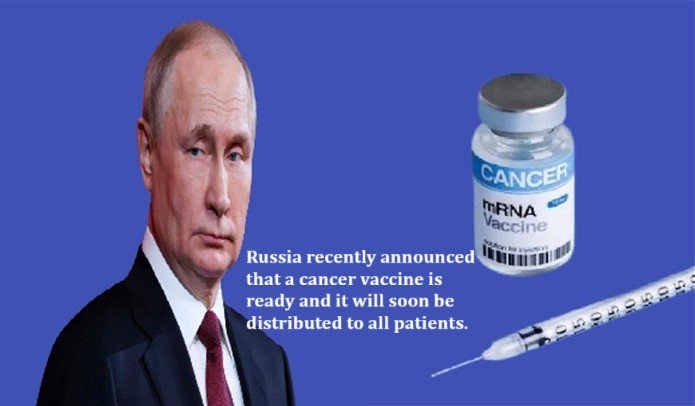
In 2024, President Vladimir Putin stated that Russia was nearing development of cancer vaccines as part of its biomedical ambitions.
Russia is making headlines with its ambitious cancer vaccine program. Using mRNA technology, personalized immunotherapy, artificial intelligence (AI)-assisted development, and free distribution plans, the country aims to change how cancer is treated. Here’s what is known, how it compares globally, and what Russia is planning next.
What We Know: Russia’s Cancer Vaccine Program
- Type & Purpose: The vaccine is treating cancer rather than preventing it. It is personalized—designed to target each patient’s tumour mutations. mRNA technology is used to train the immune system to recognize and attack cancer cells. Vanguard News+4India Today+4The Economic Times+4
- Cost & Free Access: The cost of producing one dose is estimated at ~300,000 rubles (≈ US$2,800-$3,000). However, the Russian government plans to offer it free of charge to Russian citizens once approved. Eka Care+4India Today+4The Economic Times+4
- Development Speed & AI Use: Russia is using artificial intelligence / neural network computing to accelerate vaccine design. Tumour sequencing to vaccine blueprinting is claimed to take about 30 minutes to an hour in some statements. India Today+2The Economic Times+2
- Trial Timeline: Human clinical trials are expected to begin around September-October 2025, especially focusing on melanoma initially, with major oncology centres in Moscow leading the way. NewsBytes+2MedPath+2
- Incidence & Need: Cancer burden in Russia is rising. In 2022, there were over 635,000 new cases (colon, breast, lung being among the most common). Annually, Russia sees about 625,000 new cancer diagnoses, and about 4 million people living with cancer per reported estimates. The Economic Times+2India Today+2
What Other Countries Are Doing
Russia isn’t alone in exploring cancer vaccines, especially those using mRNA and personalized immunotherapy.
- BioNTech’s Lung Cancer Vaccine Trials: Multiple countries (UK, US, Germany, etc.) are running clinical trials on mRNA vaccines for non-small cell lung cancer (NSCLC), aiming to prime the immune system to target tumour markers. The Guardian
- Glioblastoma & Melanoma Vaccines: Research in the U.S. and Europe into cancer vaccines tailored to specific cancer types like melanoma or glioblastoma is underway, though often early stage. The focus is often on safety, immune responses, and relatively long timelines.
- Regulatory & Cost Barriers: Many countries are grappling with regulatory complexity, high R&D costs, and infrastructure for personalised medicine. These vaccines tend to be expensive to develop, manufacture, and distribute.
What Russia Plans Next
Based on the available information, here are Russia’s next steps and likely challenges:
- Clinical Trials Launch (Late 2025): The initial phase will likely involve melanoma and possibly expansions to other cancer types. Close monitoring of safety, immune response, tumour suppression, and metastasis control. NewsBytes+2MedPath+2
- Regulatory Adjustments: Russia is reportedly introducing specialized regulatory processes that recognize the individualized nature of such vaccines (different from standard vaccine or drug approvals). This may accelerate approval timelines for personalized treatments. The Economic Times+1
- Full Public Rollout: If trials go well, Russia intends to make the vaccine freely available to its citizens. Coverage may expand across multiple cancer types over time. NewsBytes+2India Today+2
- Scaling Up Production & AI Integration: To make this feasible, Russia will need to scale production capacity (labs, mRNA manufacturing, quality control), integrate AI for faster vaccine design, and ensure logistical/health system readiness.
- Addressing Safety & Efficacy: Key issues will include long-term efficacy, side effects, potential immune system overreactions, and ensuring that “personalization” genuinely reflects clinical benefit across different populations.
Points of Caution & Questions
- Claims of “100% efficacy” or very high success rates should be interpreted carefully—peer-reviewed data, published clinical trial results, and independent oversight will be important. Currently, much information comes from preliminary or state media sources. The Times of India
- Which cancer types will respond best? Some cancers (melanoma, certain skin cancers) are more tractable immunologically than others (e.g. pancreatic, brain cancers).
- Cost & scalability outside urban centres; equity of access.
- How this fits into global regulatory frameworks and how cross-border sharing of cancer vaccine technology / knowledge might happen.
Sources
- India Today – “Russia develops mRNA cancer vaccine, will distribute it for free” India Today
- Economic Times – “Russia commences human trials of revolutionary personalized cancer vaccine” The Economic Times
- The Times of India – “Russia has developed its own cancer vaccine to be distributed free of charge” The Times of India
- NextMSC / NewsBytesApp – Reports on clinical trial start timeline & AI-driven personalized vaccine development NewsBytes+1






